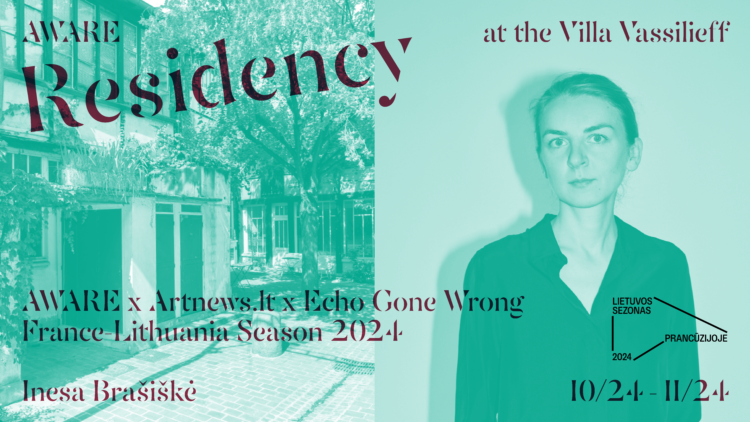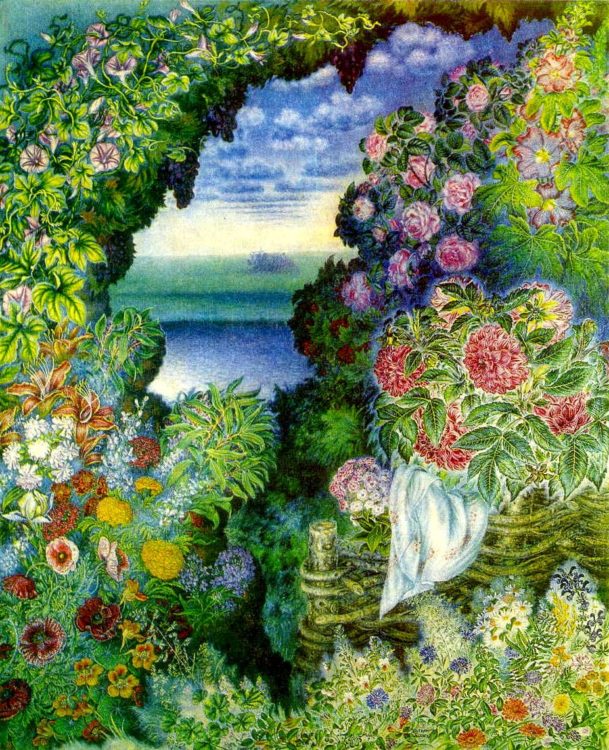Events
Agnė Jokšė, Voiceless Signs (fragment), 2024, © Agnė Jokšė
21, avenue du Maine
75015 Paris
Montparnasse – Bienvenüe metro station, Exit 2, Lines 4, 6, 12 and 13
Villa Vassilieff is accessible to visitors using wheeled devices or who have mobility difficulties thanks to special facilities (access ramp, adapted toilets, and a lift).
In addition, several reserved parking spaces are available close to the Villa Vassilieff:
• in front of 4 rue d’Alençon, 75015 Paris
• in front of 7 rue Antoine Bourdelle, 75015 Paris
• in front of 23 rue de l’Arrivée, 75015 Paris
Consult the map of adapted parking spaces in Paris here.
As part of the “Women’s Voices: Representation of 20th and 21st Century Lithuanian Women Artists” program, in partnership with Artnews.lt and Echo Gone Wrong within the scope of the 2024 France-Lithuania cultural season, researcher-in-residence Inesa Brašiškė will present her research on November 28, in conversation with Franco-Belgian collective Bye Bye Binary, artist and writer Agnė Jokšė and curator and art historian Oksana Karpovets.
The evening is dedicated to contemporary feminist and queer engagement with language as it appears in artists’ and activists’ work. Through their work, they explore language’s performative capacity to make bodies both appear and disappear and examine the potentials and pitfalls of translation and re-writing, communication and misunderstanding.
The event will feature a performative lecture by artist and writer Agnė Jokšė on emancipatory potential of storytelling but also on limits of translation and attunement; a presentation on the possibility of the post-binary language and critical potentials of rewriting by Bye Bye Binary (BBB); and a reflection on voice and storytelling in Ukrainian feminist art by Oksana Karpovets. Navigating through English, French, Lithuanian and Ukrainian, the conversation is also an exercise in comprehension, a momentary alliance even if based on what Aruna D’Souza calls “imperfect understandings”.
Description in Lithuanian on the website of artnews.lt
Practical information
Thursday, November 28, starting 6:00 pm
Free entry, no registration required
The conversation will navigate through English, French, Lithuanian and Ukrainian
Bye Bye Binary (BBB) is a Franco-Belgian collective, a pedagogical experiment, a community, a variable typo-graphic creation workshop, a network, an alliance. The collective, formed in November 2018 during a joint typography workshop at the erg (School of Graphic Research) and La Cambre (Brussels) proposes to explore new graphic and typographic forms adapted to the French language, in particular the creation of glyphs (letters, ligatures, liaisonor symbiotic elements) taking language and inclusive writing as their starting point, field of experimentation and research subject.
This 2018 session, called “Des imaginaires possibles autour d’une typographie non-binaire” [The possible imaginaries of non-binary typography], was a revelation for the majority of organizers and participants: seized by the power and stakes we were raising with our tools, we federated to pursue this adventure of demasculinizing and debinarizing language through the creation of glyphs and their functional circulation thanks to the setting up of QUNI [The Queer Unicode Initiative] and the launch, in 2022, of the first version of the typothèque. Identifying itself as a variable-geometry collective, BBB is made up of around twenty members, welcoming newcomers as the years go by. The collective is made up of a variety of profiles rooted in the real world: artists, bakers, teachers, students, graphic designers, performers, typographers, theorists, tattoo artists… Bye Bye Binary is currently active in the fields of art and design. Its multi- and trans-disciplinary practices have been both presented in art institutions (Centre Pompidou (2023, FR), CAC, Brétigny (2023), MUDAC (2021), Musée de la Mode et de la Dentelle (2021) and supported by them as part of production and research residencies (Station Gare des Mines & 6b (2024, FR), Recycl’art (2022, BE), Centre Wallonie-Bruxelles (2021, FR) Maison Populaire (2021, FR. These are also part of a series of typographic forks commissioned from cultural partners (Théâtre National Wallonie-Bruxelles (2023, BE), La Balsamine (2022, BE), FAME Festival (2022, BE), Ballet National (20XX, FR), ESADSE (20XX, FR).
Agnė Jokšė artist and writer, currently based in Vilnius. Using the tools characteristic to autoethnography, Jokšė tells stories in which personal experiences and past events related to contemplations of love, intimacy, relations and friendship intertwine with imaginative reflections. Often works in mediums like video, and performative text, investigates questions concerning parallel histories, compassion, entangled relations, queerness and language.
Recent projects include a solo exhibition at Editorial, Vilnius, presentations at Edinburgh Art Festival, Pickle Bar Berlin, GIBCA, Gothenburg, National Gallery of Art, Vilnius, Tallinn Art Hall, Tallinn, e-flux screening room, New York, CCA, Glasgow, Cell Project Space, London, Artists’ Film International, Whitechapel Gallery, London; Baltic Triennial 14, Vilnius, NAC, Nida; Mimosa House, London. The artist’s work Dear Friend was granted the JCDecaux Award in 2019.
Oksana Karpovets is a Ukrainian curator and art historian currently based in Paris. She has curated a number of exhibitions, including When the Inconceivable Takes Form (2023), Cité Internationale des Arts, Paris and Human (2023)(with Edyta Wolska), Baltic Gallery of Contemporary Art, Slupsk. She has also curated an event “Persona and her Shadow: Ukrainian Women’s Resistance in Arts and Literature” at AWARE in 2023. She completed professional training at the Museum of Modern Art in New York and the San Francisco Museum of Modern Art and has held curatorial positions at the Zimmerli Art Museum in New Brunswick, USA and the Jam Factory Art Centre in Lviv, Ukraine. She holds an MA in Museum Studies from New York University and is currently working on her dissertation entitled: Ukrainian Video Art (the 1980s-2020s): An Inter-media Instrument for Emancipation, Re-politicisation and Social Change at the Sorbonne University.
Inesa Brašiškė is a Vilnius-based art historian and curator. She holds an MA in Modern and Contemporary Art: Critical and Curatorial Studies (MODA) from Columbia University. Her curatorial work appeared at the National Gallery of Art in Vilnius, Contemporary Art Centre (CAC Vilnius), e-flux screening room, and Art in General. Following a decade of independent curation, she now serves as head of research at the Sapieha Palace, a CAC branch, where she curates contemporary art exhibitions, directs a monthly artists’ film program, and organizes an annual international symposium. I. Brašiškė’s academic research focuses on conceptual art and displacement, artistic labor, feminist art history writing in Eastern Europe, and avant-garde cinema and feminist screen cultures since the 1960s. Her recent scholarship reconsiders abstract painting through feminist histories of making, examines the critical potential of blurring, and explores artistic and curatorial engagement with archives in the Baltics. Her writing has appeared in CAA News, MoMA C-MAP Post, and Mousse Magazine, alongside numerous exhibition catalogs and books. I. Brašiškė was nominated for the ICI Curatorial Award in 2014, and her research has been supported by several grants, including the Getty Library Research Grant, the Paul Mellon Centre Grant, and the CAA-Getty International Program Grant.
This project is a part of the season of Lithuania in France 2024, organized by the Lithuanian Culture Institute and the French Institute in Paris.














